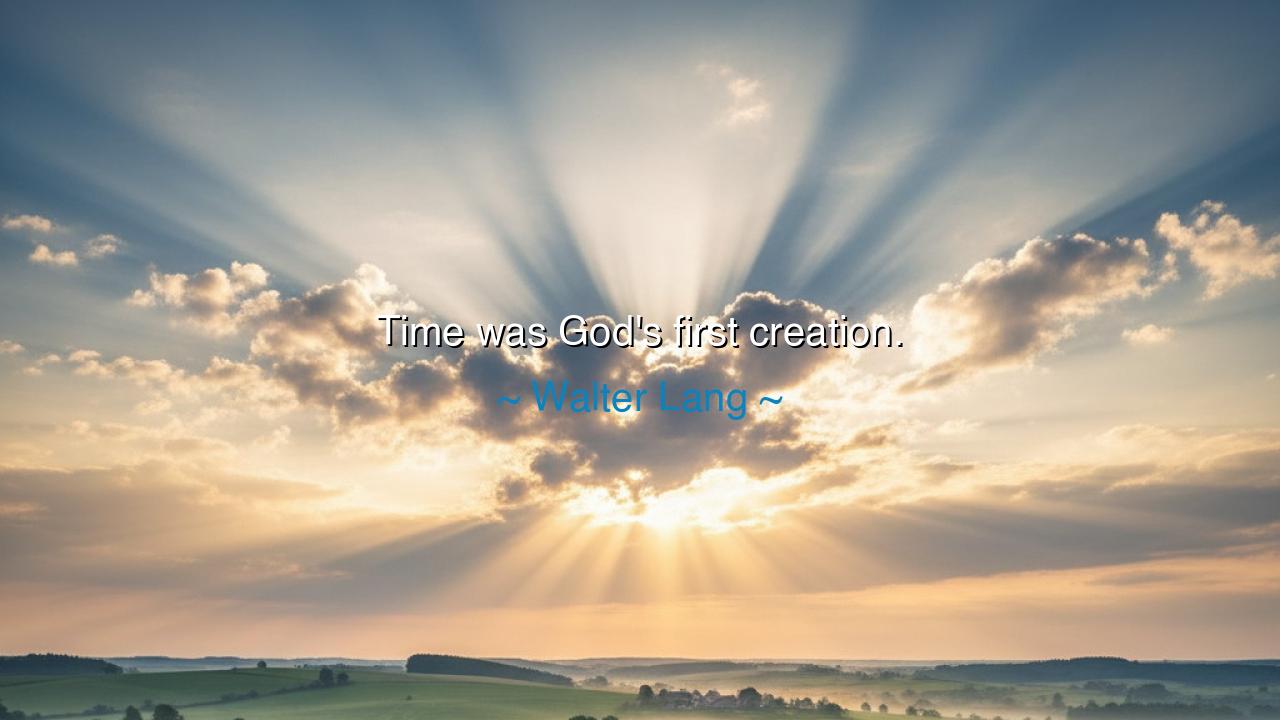
Time was God's first creation.






The thinker Walter Lang gave voice to a truth both mystical and profound when he declared: “Time was God’s first creation.” In this brief utterance, he placed before us the foundation of all existence. For before there could be stars, before seas could swell or mountains could rise, there had to be a measure, a rhythm, a flow by which creation itself could unfold. Without time, there is no becoming, no history, no story. Thus, time is not merely a backdrop but the very first canvas upon which all things were painted.
The origin of this thought lies in the long tradition of theology and philosophy, where sages have wrestled with the mystery of beginnings. In the Hebrew Scriptures, the Book of Genesis begins with the words, “In the beginning God created…”—a phrase that already implies time, for to speak of a beginning is to speak of time’s dawn. Augustine, centuries before, meditated that time itself was born with creation, for there can be no “before” the beginning. Walter Lang, echoing such wisdom, crystallized it into a single phrase: the first act of God was the weaving of time.
The ancients themselves revered this truth. The Greeks spoke of Chronos, the devourer, as one of the primal forces of existence. The Hindus spoke of the endless cycles of yugas, in which the universe is born, dissolves, and is born again. The Egyptians, too, measured time through the eternal flow of the Nile, believing their gods had set its rhythm as a mirror of eternity. All these traditions point to the same insight: before form, there must be duration; before creation, there must be the stage of time.
History itself bears witness to the majesty of this truth. Consider the voyage of Isaac Newton, who gazed into the heavens and saw not only planets in motion but the ticking of a universal clock. His laws described the mechanics of time’s unfolding, yet even he admitted awe before the One who set it in motion. For all his equations, Newton confessed that the universe’s grandeur reflected the ordering hand of God. Here we see Lang’s wisdom: time is the first creation, the foundation upon which science, history, and human life are built.
But if time is creation’s first gift, then how should we live within it? The lesson is clear: we must treat time not as a cheap commodity to be squandered, but as holy ground. For each moment is a fragment of the first act of God, a spark from the eternal forge. To waste it is to despise the gift; to honor it is to honor the Creator. The fleeting hour, the single breath, the passing dawn—these are sacraments, sacred vessels in which life itself is carried.
Therefore, let us walk as wise stewards of time. Do not squander your days in idle distraction. Do not treat your hours as though they were without cost. Instead, awaken each morning with reverence: this day is not merely given—it is part of the first creation itself. Fill it with purpose, with kindness, with courage. Let your use of time reflect gratitude to the One who made it.
In practice, I counsel this: set aside moments for reflection, that you may not drift unthinking through the river of hours. Mark your time with deeds of love and labor that endure beyond the moment. Learn to distinguish between what is urgent and what is eternal, between the noise of the passing and the weight of the lasting. For the true honor of time is not to count it, but to fill it with meaning.
Thus, hear and remember the wisdom of Walter Lang: time was God’s first creation. It is the womb of all other things, the silent companion of every joy and sorrow, the first and final gift. Treat it not lightly, but as sacred. And if you use it well, then though the hours pass, their meaning shall endure forever.






AAdministratorAdministrator
Welcome, honored guests. Please leave a comment, we will respond soon